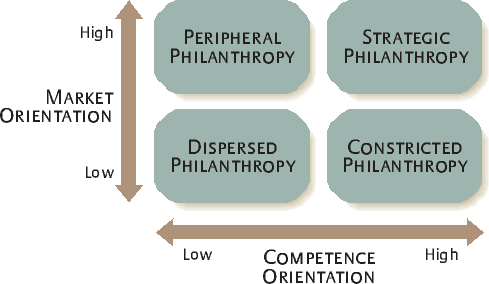How startups should embrace corporate philanthropy from day one
The Function of Company Philanthropy in Fostering Sustainable Organization Practices
Corporate philanthropy has become an essential technique for organizations intending to incorporate sustainability into their operations. By lining up corporate purposes with social and ecological campaigns, companies can foster healthier ecosystems. This approach not only improves business credibility but also reinforces stakeholder connections. Nonetheless, truth level of its effect on lasting business success stays to be discovered. What innovative practices are being embraced therefore?
Comprehending Business Philanthropy and Its Significance
Corporate philanthropy acts as a crucial device where services can contribute to social health while boosting their very own reputations. This method entails companies allocating sources, such as funds, time, or experience, to sustain area efforts, charitable reasons, or social programs. By taking part in kind efforts, firms can resolve pressing social problems, such as education and learning, healthcare, and ecological worries, therefore playing a crucial duty in fostering positive modification.
Business philanthropy can boost worker spirits and attract talent, as people progressively seek to work for socially responsible organizations. It can also strengthen customer commitment, as customers prefer brand names that show a commitment to making a difference. Eventually, comprehending the importance of business philanthropy lies in recognizing its twin benefits: enhancing community welfare while all at once enhancing organization reliability and dependability in the eyes of stakeholders. This alignment of social duty with industrial interests underscores its significance in today's company landscape.
The Connection In Between Corporate Philanthropy and Sustainability
While many companies involve in philanthropy to boost their public picture, a deeper connection exists in between company philanthropy and sustainability. Company philanthropy commonly lines up with sustainable methods by supporting efforts that resolve social and environmental challenges. They add to a much healthier environment and society when services invest in neighborhood jobs, eco-friendly power, or educational programs. This commitment not only fosters goodwill but likewise reinforces stakeholder relationships, enhancing brand name loyalty.
.png)
Case Studies: Successful Business Philanthropy Initiatives
Countless business have successfully integrated kind campaigns right into their company techniques, showing the concrete advantages of such dedications. For example, Microsoft has introduced countless programs, such as its AI for Planet effort, which supports ecological sustainability through technology. This method not only aids conservation initiatives however likewise enhances Microsoft's reputation as a leader in company duty.
Unilever's Sustainable Living Strategy stresses social and environmental impact, straightening its philanthropy with business purposes. By funding projects that boost hygiene and sanitation, Unilever enhances its brand while adding to worldwide wellness.
Another remarkable instance is Patagonia, which pledges 1% of sales to ecological reasons. This commitment reverberates with customers, fostering commitment and driving sales.
These study highlight that effective business philanthropy can generate financial go to the website returns while promoting sustainable practices, enhancing the concept that honest business techniques are useful for both culture and profits.
Building Stronger Stakeholder Relationships Via Philanthropy
Philanthropy functions as a vital device for companies seeking to enhance their partnerships with stakeholders, as it fosters trust fund and shows a commitment to social duty. By engaging in charitable efforts, businesses can get in touch with neighborhood communities, enhancing their online reputation and motivating stakeholder loyalty. This involvement typically causes purposeful interactions, creating a sense of common worths in between the company and its stakeholders.
Philanthropic efforts can deal with certain neighborhood demands, allowing organizations to contribute positively to societal difficulties. This participation not only showcases a firm's moral stance however additionally helps in attracting and keeping clients who focus on social obligation.
In addition, staff members often feel this post extra determined and involved when they see their company actively taking part in kind activities, leading to an extra effective workplace culture. Subsequently, corporate philanthropy comes to be a critical avenue for developing stronger, more resistant connections with diverse stakeholder groups.
Determining the Influence of Company Philanthropy on Service Success
The link between corporate philanthropy and stakeholder engagement establishes the stage for examining its influence on general organization success. Organizations usually measure this influence through various metrics, consisting of brand name track record, employee fulfillment, and client commitment. Philanthropic initiatives can improve a company's image, cultivating trust amongst financiers and consumers alike. Additionally, engaged workers have a tendency to exhibit greater morale and productivity, straight associating to improved service efficiency.
Measurable evaluation can additionally be used, with companies examining monetary returns against philanthropic expenditures. Research study indicates that firms with solid kind dedications frequently experience greater stock efficiency and minimized volatility. Additionally, qualitative evaluations, such as stakeholder responses, can provide insights into community understandings and long-lasting relational benefits.
Ultimately, measuring the effect of corporate philanthropy requires a diverse approach, integrating both measurable and qualitative data to assure a complete understanding of its impact on service success. corporate philanthropy.
Frequently Asked Concerns
Just How Can Local Business Participate In Corporate Philanthropy Efficiently?

What Prevail Misconceptions Concerning Business Philanthropy?

Exactly How Does Corporate Philanthropy Influence Worker Morale?
Corporate philanthropy positively affects worker morale by cultivating a feeling of objective, enhancing work contentment, and advertising commitment. Staff members usually feel extra engaged and motivated when their company contributes to site web social reasons, producing a supportive workplace.
What Are the Tax Obligation Benefits of Company Philanthropy for Companies?
Company philanthropy uses considerable tax advantages for services, consisting of deductions on charitable payments and potential decreases in gross income. These motivations encourage firms to participate in social campaigns while concurrently enhancing their monetary standing.
How Can Firms Choose Efficient Philanthropic Partners?
Business can select efficient philanthropic companions by assessing alignment with their values, evaluating effect possibility, examining financial openness, and promoting strong communication. This critical approach enhances collaboration and warranties common advantages for both parties involved.
Business philanthropy serves as an essential system via which services can add to social health while boosting their own track records - corporate philanthropy. Eventually, recognizing the significance of business philanthropy lies in recognizing its double benefits: improving community well-being while simultaneously boosting organization reliability and trustworthiness in the eyes of stakeholders. While several firms engage in philanthropy to boost their public photo, a much deeper connection exists in between corporate philanthropy and sustainability. The link in between business philanthropy and stakeholder involvement establishes the phase for assessing its effect on overall business success. Company philanthropy supplies substantial tax obligation advantages for companies, consisting of deductions on philanthropic contributions and potential decreases in taxed earnings